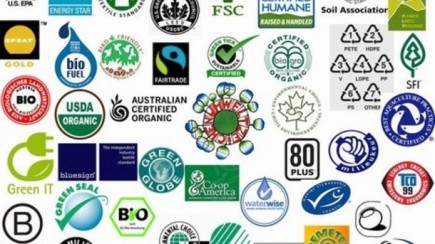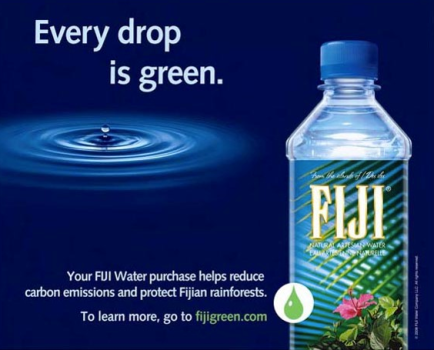Has this ever happened to you? You’re trawling through the supermarket and you stop at the egg section. You proudly pick up a carton of free-range eggs and place them in your trolley, while you gasp and try to hide your disappointment as someone else reaches for a carton of caged eggs.
Or, conversely, have you ever looked incredulously at someone for picking up the nine dollar (nine dollars?!) packet of organic frozen berries, while you pat yourself on the back for saving precious dollars on the home brand ones?

Source: Illustration by Cathy Wilcox
The decision to purchase (or not purchase) ‘sustainable’ and ‘ethical’ food products that are free range, organic, non-GMO or vegan, is a topic that fascinates me, especially due to social media’s influence that has been embedded into the fabric of our modern society.

Source: Food Navigator
Now, more than ever, we are surrounded by food activism at the hands of social media platforms, as Adamoli (2012) describes, “In the digital world, the citizen-consumer has agency through the access to technology used as vehicles of protest.”
This impact of new media technologies is undeniable.
Large scale social media activism in the name of environmental sustainability has spanned from Oxfam’s ‘Behind the Brands’ campaign, to NGO campaigns against palm oil products in the UK, to the recent international #Strike4Climate protests.

Source: Tes
It is clear: saving the planet has become a trend.
But, are we treating this trend like a clothing trend that we follow to merely fit in, but later throw to the back of our wardrobes when it goes out of fashion? Or do we genuinely care?
Food companies have certainly taken advantage of this trend. While media technologies have enabled more awareness about buying sustainable food products, it has also been used as a weapon by food companies for marketing and “selling moral values”. (Kamolnoratep, 2018) Through this, we can see how social media is often a double edged sword.
In other words, a label convinces us to feel like we are making a difference to the planet, also referred to as “greenwashing” consumers, which is “…the act of outwardly promoting sustainable ideas to draw attention away from the waste produced or lack of benefits.” (Lopez-Quezada, 2018)
Fiji Water’s “every drop is green” campaign is a prime example of this, promoting that its product helps to save the environment, despite the energy costs and plastic waste that results from shipping it internationally.

Source: Fiji Water
We, as consumers, often overlook this however, which may be attributed to ‘moral licencing’: the idea that “…shortly after buying an ethical product, a consumer is more likely to give into the temptation of products they consider less ethical or good.” (Hanmer-Lloyd, 2017) I believe that moral licencing would be an interesting concept to further explore, and discover its link to individuals’ decision to purchase ethical and sustainable food products. Why do we often tend to buy free range eggs, but then opt for non-free range chicken?
I know that I have been guilty before of feeling high and mighty for choosing to buy a product that ‘helps to save the environment’, without questioning the food production practices behind the product or my other ethical food buying decisions. As a result, this has prompted my research question:
Buying organic and free range food products: are we really helping to save the environment, or are we being influenced by the food industry’s ‘sustainable’ marketing labels?
There are a myriad of different types of sustainable and ethical food labels, so I believe by narrowing down the focus to organic and free range products allows greater depth. I would also like to explore the following sub-questions to help address different facets of my overall topic:
What impact do social media platforms influence our decisions to purchase ethical and sustainable food choices?
What impact do food companies’ marketing practices of labeling and tactic of selling ‘moral value’ have on consumers?
When buying food products that are ethical or sustainable, do we have an understanding of the meanings behind the labels?
I believe that this research topic is extremely relevant in today’s society, due to the ever increasing environmental activism occurring, and the role that social media plays as a catalyst. What’s more, is that food is an inherent part of every human’s life – therefore this is a topic that affects all of us in one way or another and has social, political and moral significance. This idea is reflected by Adamoli (2012), who argues “Food is political. In the instance we grow a tomato, we buy a turkey at the supermarket and we prepare a meal to eat, we have indulged in politics.”
In addition, environmental activism is an issue that will only continue to intensify. Therefore, by addressing my research question, there may be opportunity to shed light on how social media can be better used as a tool to educate, and allow consumers to make meaningful and genuine impacts when buying ethical food products.
Bibliography
Adamoli, G. 2012 Social Media and Social Movements: A Critical Analysis of Audience’s Use of Facebook to Advocate Food Activism Offline, Accessed 14 March 2019
http://citeseerx.ist.psu.edu/viewdoc/download?doi=10.1.1.660.742&rep=rep1&type=pdf
Hanmer-Lloyd, W. 2017 Why doing good can leading to doing bad: How moral licensing influences consumer behaviour and buying, The Drum, Accessed 15 March 2019
https://www.thedrum.com/opinion/2017/03/07/why-doing-good-can-lead-doing-bad-how-moral-licensing-influences-consumer
Kamolnoratep, P. 2018 Is organic food sustainable? Sydney Environment Institute, Accessed 12 March 2019
http://sydney.edu.au/environment-institute/blog/organic-food-sustainable/
Lopez-Quezada, G. 2018 Greenwashing in the age of social media, Medium, Accessed 12 March 2019
https://medium.com/@1522658624159/greenwashing-in-the-age-of-social-media 8966af35f931
